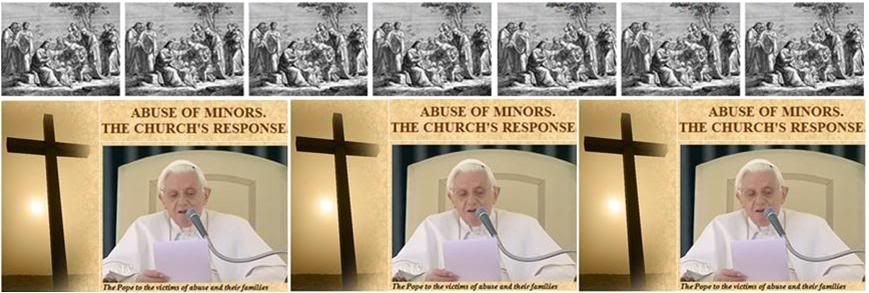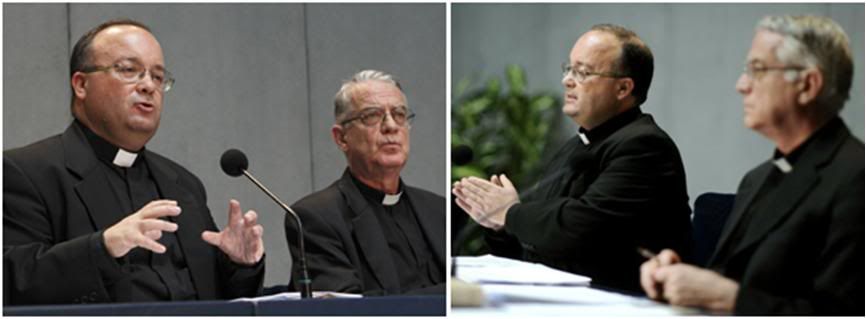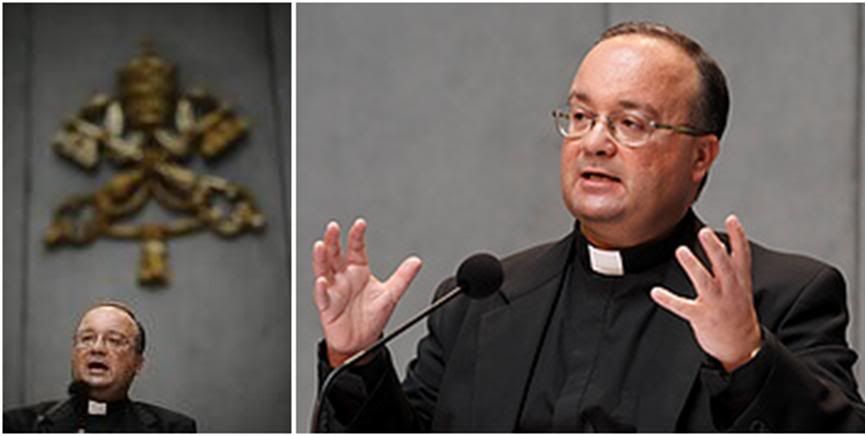 ZENIT and CNS took more trouble than the MSM to report on the explanatory remarks made by Mons. Charles Scicluna on the revised CDF norms De gravioribus delictis, to underscore the significance of the canon law revision beyond the substantive procedural changes it codifies.
Pope's resolve reflected in revised Norms:
ZENIT and CNS took more trouble than the MSM to report on the explanatory remarks made by Mons. Charles Scicluna on the revised CDF norms De gravioribus delictis, to underscore the significance of the canon law revision beyond the substantive procedural changes it codifies.
Pope's resolve reflected in revised Norms:
Special faculties previously allowed to CDF
now codified into Church law
unless modified by a future Pope
By Jesús Colina

VATICAN CITY, JULY 15, 2010 (Zenit.org).- A revised set of norms released today regarding the 'serious crimes' under Church law is another clear sign from Benedict XVI on how seriously he takes these matters, including the sexual abuse of minors, an official from the Congregation for the Doctrine of the Faith said today.

Monsignor Charles Scicluna, promoter of justice [in effect, chief prosecutor] at the doctrinal congregation, joined Vatican press director Fr. Federico Lombardi today to present updated documents regarding canonical crimes reserved to the jurisdiction of that dicastery.
Before being elected Pope, Cardinal Joseph Ratzinger was the prefect of the Congregation for the Doctrine of the Faith. The norms presented today, in fact, organize into one document some faculties granted the congregation under his tenure.
In fact, much of the content of the new document, which was approved by Benedict XVI on May 21, was already in force.
The revisions are an update to the 2001 apostolic letter "Sacramentorum Sanctitatis Tutela," which outlined the norms for addressing cases of "gravioribus delictis" (grave crimes).
In addition to norms regarding priests who sexually abuse minors, the revision clarifies crimes against the Eucharist, the sacraments of confession and holy orders, and crimes against the faith.
Monsignor Scicluna, who coordinates a team of eight ecclesiastical magistrates, explained that this document is significant, if one keeps in mind that the previous norms were promulgated less than 10 years ago, in 2001, and then, in 2003, Pope John Paul II granted the Congregation for the Doctrine of the Faith specific "faculties" to judge particularly grave crimes.
These "faculties," he clarified, were not integrated into the 2010 Norms, now revised and updated. The monsignor said that organizing the faculties into one clear document which updates the apostolic letter gives them more weight.
He explained that "the faculties have a rather ephemeral life: they depend a lot on the will of the Supreme Pontiffs."
But Benedict XVI, the monsignor noted, "no sooner than he was elected, expressed the desire that the faculties held by the Congregation for the Doctrine of the Faith should be stabilized as norms, which unlike special faculties, "remain in force until a Pope authorizes their modification."
Among the norms dealing with sexual abuse of minors, the new document doubles the statute of limitations, extending it from 10 years from the victim's 18th birthday to 20 years -- a period longer than that generally stipulated in civil legislation. Exceptions even for the 20-year limitation can be made on a case-by-case basis. Exceptions to the 10-year limit had already been the practice.
Another novelty makes it possible for laypeople to serve on ecclesiastical courts as lawyers or attorneys.
Monsignor Scicluna explained the reason for this change: "At the diocesan level, the contribution of the laity is essential - as when the bishop needs expert opinion in evaluating a case, when he needs the competence of psychologists, sociologists, experts in child psychology, and on the influence of abuse on the victim."
"Wee cannot find all these competencies in the clergy," he added. "We know that there are bishops who have made use of the competence of former policemen to carry out their investigations, as they wanted to arrive at the truth. And, for us, this is very important."
One of the novelties that sparked most interest among journalists is the "right, with the previous mandate of the Roman Pontiff," to judge cardinals, patriarchs, legates of the Apostolic See and bishops. [This, too, is a [provision surprisingly overlooked by the Anglophone MSM, but quickly underscored by the Italian media. In fact, it is Article 1, Par 2, of the revised Norms, namely:
§2. With regard to the delicts mentioned above in § 1, the Congregation for the Doctrine of the Faith, by mandate of the Roman Pontiff, may judge Cardinals, Patriarchs, Legates of the Apostolic See, Bishops as well as other physical persons mentioned in can. 1405 § 3 of the Code of Canon Law, and in can. 1061 of the Code of Canons of the Eastern Churches
"This is an important sign, as it means that the Congregation for the Doctrine of the Faith will be able to investigate and submit its findings to the Pope," explained Monsignor Scicluna.
The revision to the norms does not stipulate anything about reporting sexual abuse of minors to civil authorities
because the norms deal with canon law, not civil law, Mons. Scicluna explained.
He made it clear that "this is not a step backward regarding the obligatory character of turning in allegations to civil courts... (but) "it is not the task of the canonical legislator to enter into the field of civil law."
He said that any Christian must obey civil law when civil law is just, and "there is no doubt that in this case the civil law is just."
"For this reason, if the allegation requires it, there is no way to escape reporting it to the civilian justice system," the monsignor added. "If the law gives the victim the option to decide whether he wants to file charges in civilian court, his will must also be respected".
Revised norms send clear signal
on sex abuse, Vatican official says
By John Thavis

VATICAN CITY, July 15 (CNS) -- A leading Vatican official said Pope Benedict XVI's approval of revised norms on clerical sex abuse sent a clear signal that the Church is serious about protecting children and punishing abusive priests.
At the same time, the official said, the Vatican norms alone cannot resolve the problem of sexual abuse, which will require a continued and coordinated effort at every level of the Church.

Msgr. Charles Scicluna, the promoter of justice at the Congregation for the Doctrine of the Faith, made the comments July 15 at a briefing for reporters on the revised norms, which simplified and streamlined many of the Church's procedures in dealing with priests accused of sexual abuse of minors.
Msgr. Scicluna said the doctrinal congregation was grateful to the Pope for transforming into universal church law a number of practices already in force that are aimed at dealing more quickly and efficiently with priest abusers.
"I think it gives a signal that we are very, very serious about our commitment to promote safe environments and to offer an adequate response to abuse," he said. "This is a very important step from the technical viewpoint of canon law".
[The significance, made clear in the ZENIT article, is that the provisions are no longer ad hoc, at the pleasure of the Pope, but part of canon law which will not 'expire' until and unless modified by a future Pope. This aspect has not been stressed at all ]
But a document is always a document -- it does not solve all the problems. It's a very important instrument, but it's the way you use the instrument that's going to have the real effect on the life of the Church," he said.
[Thavis makes up for the curtailed treatment of the 'non-expiration' aspect of these revised norms by reporting Scicluna's explanation for another issue.]
Msgr. Scicluna was asked why the revised norms, like the previous edition, impose "pontifical secret" on the church's judicial handling of priestly sex abuse.
He said a better term was "confidentiality," and that it was designed above all to protect the dignity of everyone involved, including the victim, the accused, their families and their communities.
He also noted that in some cases -- for example, a priest's dismissal from the priesthood -- bishops are authorized to divulge the decision and the reasons behind it if this is seen as necessary for the common good of the church.
"So the value of confidentiality is important, but it is not absolute. The good of the Church sometimes requires not confidentiality but publicity of a process that has been completed, either with a sentence of condemnation or a finding of innocence," he said.
Likewise, Msgr. Scicluna said, the Church's insistence on confidentiality has limits in the relationship with civil authorities. Bishops are required to comply with civil law that requires reporting of abuse accusations, he said.
"Confidentiality of canonical proceedings is never an impediment to the duty to denounce (crimes), and is never to the detriment of obedience to civil law," he said.
Msgr. Scicluna made it clear that Pope Benedict had made the changes in the norms, according to his area of competence.
"It is not the task of the Pope to give indications about civil law. The indication to obey the law of the state is already in St. Paul", he said, and a question of civil law need not be affirmed in a canonical law.
The revised norms extended the statute of limitations on sex abuse cases, included child pornography in the definition of sex abuse against minors and said sexual abuse of mentally disabled adults will be considered equivalent to abuse of minors.
Msgr. Scicluna was asked if he expected the revisions to prompt a new wave of sex abuse allegations or revelations.
"No, we're not expecting the floodgates to open. That happened in 2003, with the historical cases from the United States," he said. "This is an important extension of the law, but it's not a question about numbers, it's a question of assuring safeguards and respect for the dignity of those concerned."
My good intention was to set down for the record how the Vatican newspaper reported the big news from yesterday, as I always do about major Vatican events.
But I must confess I don't understand why the OR did not simply publish Fr. Lombardi's explanatory note as is, instead of 'writing' an account that simply quotes blocks of what he wrote! Surely an article signed by Fr. Lombardi is far more authoritative than a perfunctory rehash of his article by an anonymous deskman at OR. After all, it's not as if any of the regular media outlets - Catholic or secular - had used Fr. Lombardi's article in full. If the OR itself does not publish it in full, who will? So with much waste of time, here is a translation of how the OR lead article today starts out, I did not continue translating for obvious reasons. One can just go straight to the earlier post on ths page to read Fr. Lombardi's note.
Revised norms «de gravioribus delictis»:
Codified procedures clarify Church law
on crimes against faith, morals
and the sacraments
Translated from
the 7/16/10 issue of

The Congregation for the Doctrine of the Faith published Thursday, July 15, the modifications to the Norms
De gravioribus delictis on how the Church deals with crimes that she considers exceptionally grave, and therefore subject to the canonical jurisdiction of the CDF.
Such crimes include offenses against the faith, against the sacraments (of the Eucharist, Penance and Holy Orders), and against morals. including sexual abuse of minors by members of the clergy.
In a note published with the revised Norms, Vatican press director Fr. Federico Lomardi, S.J., recalls that in 2001, John Paul II promulgated the motu proprio
Sacramentorum sanctitatis tutela, giving the CDF the competence for dealing with and adjudicating under canon law a list of particularly grave offenses, a competence previously under other dicasteries or was not clearly defined.
The Pope's motu proprio was accompanied by a document of implementing and procedural norms -
Normae de gravioribus delictus.
"Over the nine years since then", Fr. Lombardi explained, "experience has naturally suggested that these Norms be integrated and updated, so as to streamline and simplify the procedures and make them more effective, and to take account of new problems".
This has been achieved principally, he said, "by the Pope attributing new "faculties" to the Congregation for the Doctrine of the Faith; faculties which, however, were not organically integrated into the initial Norms. This has now come about, within the context of a systematic revision of those Norms"...
[From here on, the article simply swings in like manner between direct and indirect quotations from Fr. Lombardi's note without adding anything new, so I won't bother translating the rest!]
[Modificato da TERESA BENEDETTA 17/07/2010 00:17]